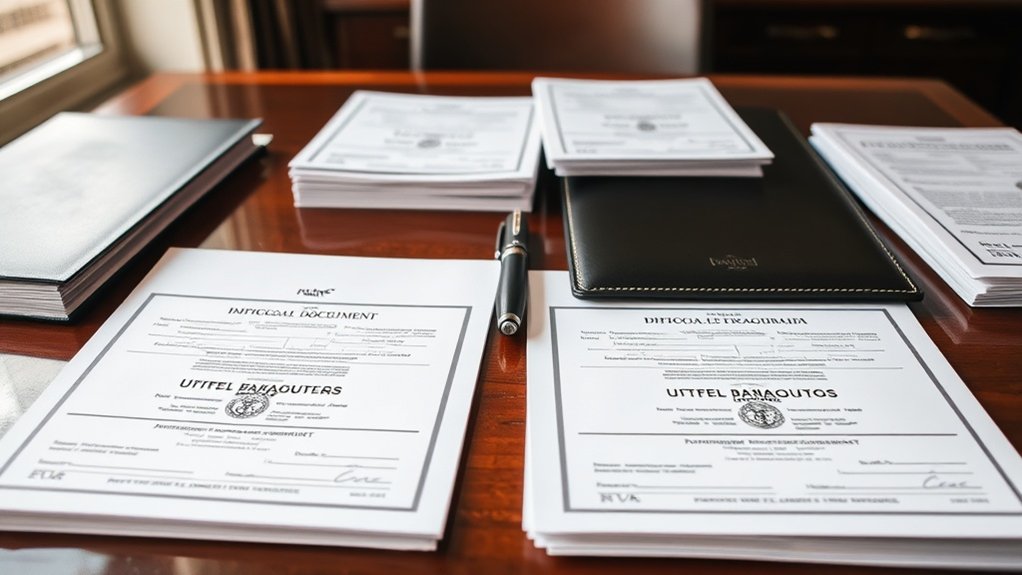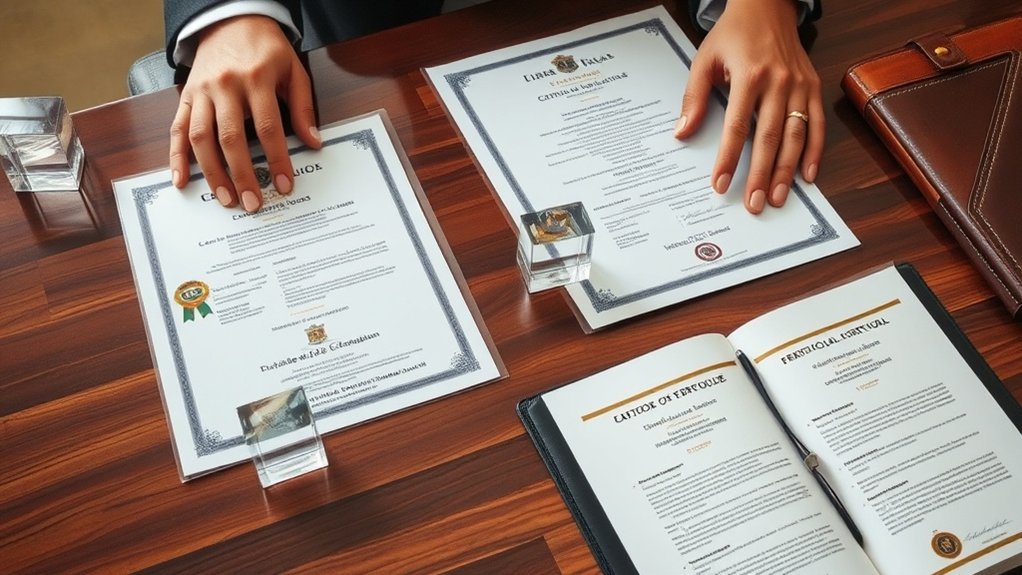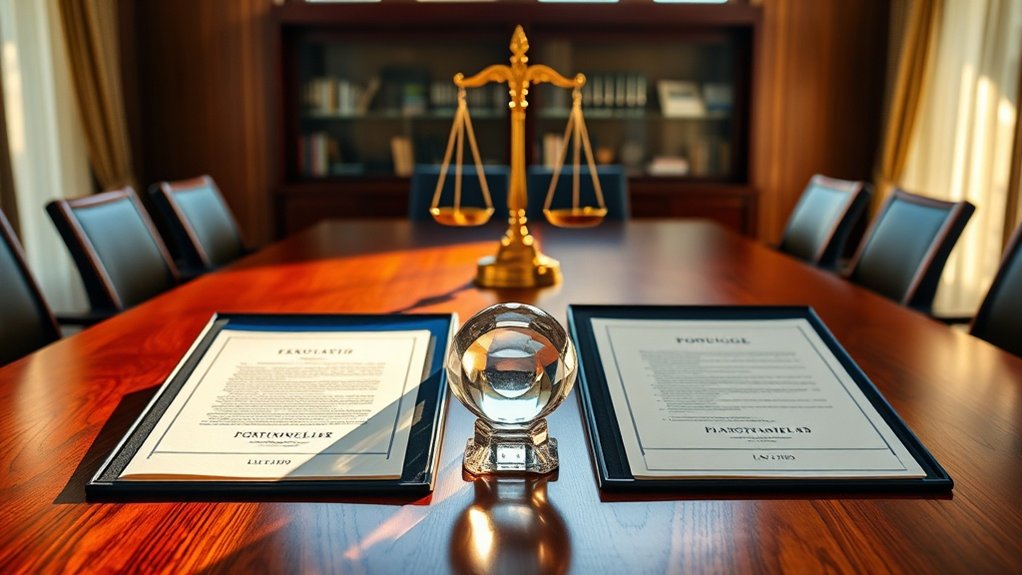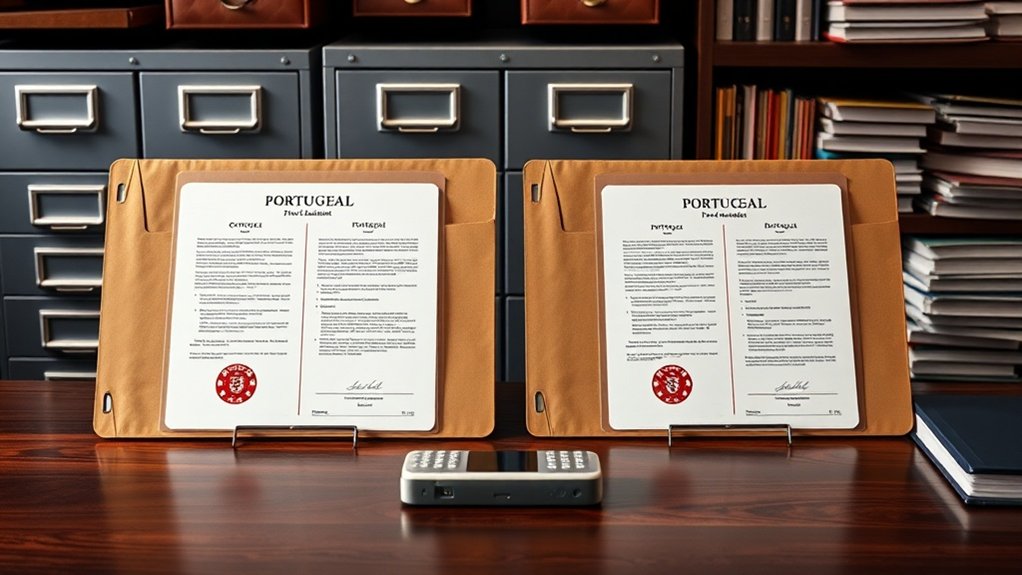You’ve probably experienced the frustration of having perfectly valid documents questioned or delayed because of translation issues during immigration processes. When dealing with Brazilian consulates and federal police, even minor misinterpretations can derail your case for months. That’s why Vieira Braga Advogados has developed a comprehensive bilingual filing system that anticipates these communication barriers before they become costly problems. The strategy addresses something most applicants don’t consider until it’s too late.
The Communication Challenge in Brazilian Immigration Processes

When you’re navigating Brazil’s immigration system, language barriers can transform routine procedures into overwhelming obstacles. You’ll find that federal police officers and consular staff often struggle with English-language documents, leading to delays, rejections, or requests for additional clarification that could’ve been avoided.
Your carefully prepared visa application might get misinterpreted because technical legal terms don’t translate directly between Portuguese and English. Immigration officers can’t always grasp the nuances of foreign educational credentials, employment contracts, or legal documents when they’re presented solely in English.
You’re essentially playing a high-stakes game of telephone where miscommunication costs time, money, and opportunities. Document translations aren’t always sufficient either – context matters enormously in immigration law. What seems straightforward to you becomes confusing when cultural and linguistic differences create gaps in understanding. These communication breakdowns affect approval timelines and can jeopardize your entire immigration process. Professional legal guidance becomes essential to navigate these complex communication challenges and ensure your documentation meets Brazilian immigration standards without misinterpretation.
Understanding the Risks of Document Misinterpretation
When you submit documents with translation errors to Brazilian consulates or federal police, you’re risking serious legal complications that can derail your entire immigration process. Common mistakes like mistranslated names, incorrect dates, or misinterpreted legal terms don’t just cause delays—they can result in document rejection, visa denials, or even accusations of providing false information. You’ll face consequences ranging from administrative penalties to potential criminal charges, making accurate translation absolutely critical for your success. Professional legal representation ensures compliance with immigration laws and reduces the risk of errors that could jeopardize your application.
Common Translation Errors
Although translation may seem straightforward, even minor errors can derail your entire consular or federal police process. You’ll encounter several critical mistakes that regularly plague document submissions. Literal translations often miss legal nuances, creating confusion about your actual status or intentions. Technical terms frequently get mistranslated, particularly in professional certifications and academic credentials. Date formats cause significant problems when translators don’t understand regional conventions. Currency conversions and financial terminology create additional complications. Names and addresses suffer from inconsistent transliteration, making verification difficult. Legal concepts don’t always have direct equivalents between languages, leading to approximations that change meaning. These errors aren’t just inconvenient—they’re expensive, time-consuming setbacks that can result in rejected applications and delayed processes. Experienced lawyers can prevent visa denials and other complications by ensuring proper documentation and organization from the start.
Legal Consequences Overview
Since document misinterpretation carries serious legal ramifications, you’re facing potential criminal charges, civil penalties, and permanent immigration consequences that extend far beyond simple application rejections. Mistranslated documents can trigger fraud allegations, resulting in visa denials that remain on your permanent record. Federal Police investigations may follow, particularly when discrepancies appear in official submissions. You’ll encounter deportation proceedings if authorities discover material misrepresentations in your documentation. Criminal prosecution becomes possible when translation errors suggest intentional deception, even if unintentional. Civil penalties include substantial fines and legal costs that accumulate quickly. Immigration bans can prevent future applications for years or permanently. These consequences affect your family members’ applications too, creating cascading legal problems that professional translation services specifically help you avoid. Specialized legal support becomes essential to navigate these complex immigration requirements and prevent costly documentation errors that could derail your entire application process.
How Bilingual Files Bridge Language Barriers

You’ll find that bilingual files eliminate communication breakdowns by meeting strict translation accuracy standards that ensure every detail transfers correctly between languages. They preserve cultural context that monolingual documents often lose, maintaining the original meaning and legal implications across different linguistic frameworks. Your documents gain credibility through rigorous authentication processes that verify both language versions meet international standards for consular and federal police requirements. Professional support from specialized immigration attorneys ensures legal security throughout every stage of the documentation process, preventing costly errors that could lead to application denials or processing delays.
Translation Accuracy Standards
When you’re dealing with consulates and federal police, even minor translation errors can derail your entire process. That’s why Vieira Braga Advogados maintains rigorous translation accuracy standards for every bilingual file they create.
You can’t afford approximations when translating legal documents. Each term must match precisely between Portuguese and English versions. The firm employs certified translators who specialize in immigration law and understand the specific terminology that consulates expect.
Every translation undergoes multiple review stages. First, the translator completes the initial work. Then, a second linguist reviews for accuracy. Finally, a legal expert ensures all technical terms align with official requirements.
This three-tier verification process eliminates discrepancies that could trigger delays or rejections. You’ll receive documents that meet international standards for legal translation accuracy. Simple mistakes in documentation can result in application denials or unnecessary delays, which is why professional legal assistance ensures compliance with current Brazilian immigration laws.
Cultural Context Preservation
Beyond technical accuracy, your bilingual files must preserve the cultural nuances that give legal documents their full meaning. When you’re dealing with consulates and Federal Police, context matters as much as translation. Your documents need to convey not just words, but the cultural framework behind legal concepts that don’t always translate directly.
You’ll find that certain Brazilian legal terms have no exact English equivalents, and vice versa. That’s where cultural context preservation becomes crucial. Your bilingual files should include explanatory notes that bridge these gaps, ensuring foreign officials understand the true intent behind your documents.
Professional legal support becomes essential when preparing these complex bilingual files, as specialized guidance helps ensure both linguistic accuracy and proper cultural context preservation throughout your immigration process.
Document Authentication Process
Since document authentication requires multiple verification steps across different jurisdictions, bilingual files serve as essential bridges that eliminate translation delays and reduce the risk of misinterpretation. You’ll find that consular officers and Federal Police can immediately verify information without waiting for certified translations, which often take weeks to complete.
Your bilingual documentation package should include parallel versions of all critical documents, ensuring both Portuguese and foreign language versions contain identical information. When you present these files, authentication officers can cross-reference details instantly, identifying any discrepancies before they become costly problems.
This streamlined approach means you won’t face rejection letters citing translation errors or incomplete documentation, saving you time and preventing unnecessary bureaucratic complications. Working with experienced legal professionals ensures your bilingual files meet all document requirements and reduces the risk of errors that commonly lead to visa denials.
Strategic Documentation for Federal Police Interactions

Documentation becomes your strongest ally during federal police encounters, as proper records can protect your rights and provide crucial evidence if disputes arise. You’ll need comprehensive files that demonstrate your legal status, purpose of visit, and compliance with immigration requirements.
Your strategic documentation should include authenticated visa applications, entry stamps, proof of accommodation, and financial statements. Keep originals separate from copies, storing them in waterproof containers. You’ll want everything translated by certified professionals, ensuring federal police can quickly verify your information without language barriers.
Create digital backups stored in cloud services accessible from any device. Include emergency contact information for legal representation and consular services. Document any previous interactions with federal authorities, maintaining detailed records of dates, officers involved, and outcomes.
When approaching checkpoints, present documents confidently and systematically. Your organized approach demonstrates respect for procedures while protecting against potential misunderstandings that could escalate unnecessarily.
All foreign documents must be translated and may require apostille certification to ensure proper authentication and acceptance by immigration authorities.
Consulate Communication Best Practices
How effectively you communicate with your consulate can determine whether you receive timely assistance during critical situations abroad. Clear, organized documentation streamlines every interaction and prevents costly delays.
Always prepare bilingual versions of essential documents before contacting consular services. This includes passports, visas, police reports, and any legal correspondence. Consular officers appreciate receiving materials in both Portuguese and the local language, which accelerates processing times significantly.
Structure your communications chronologically when explaining complex situations. Start with basic facts, then provide supporting details. Avoid emotional language or unnecessary background information that doesn’t directly relate to your request.
Maintain copies of all correspondence with timestamps and reference numbers. This creates an audit trail that proves invaluable if you need to escalate matters or reference previous communications.
Submit complete application packages rather than piecemeal submissions. Incomplete filings create additional rounds of correspondence, extending resolution timeframes and increasing your stress during already challenging circumstances.
Simple errors in documentation can lead to delays, fines, or even deportation consequences, making professional guidance essential for navigating these complex procedures.
Benefits for Multinational Corporations and Foreign Investors

When you’re operating across international borders, bilingual documentation becomes your competitive advantage in navigating complex regulatory environments. You’ll experience faster processing times and fewer bureaucratic bottlenecks when your compliance materials are readily accessible in both local and international languages. This streamlined approach directly translates to reduced operational costs and accelerated market entry timelines for your business expansion efforts.
Streamlined Compliance Processes
While traditional compliance processes often burden multinational corporations with complex paperwork and lengthy approval times, bilingual documentation systems revolutionize how you’ll navigate regulatory requirements across jurisdictions. You’ll eliminate translation delays that typically slow down visa applications, work permits, and business registrations. When your documentation arrives pre-translated and properly formatted, consulates and federal police can process requests immediately without waiting for certified translations.
Your legal team won’t need to coordinate with multiple translation services or worry about inconsistent terminology across documents. This streamlined approach reduces processing times by 40-60%, allowing you to deploy international talent faster and launch operations sooner. You’ll also minimize compliance errors that occur when technical legal language gets lost in translation, protecting your organization from costly delays and regulatory complications.
Reduced Regulatory Delays
Because regulatory delays can derail your expansion timeline and drain resources, bilingual file systems eliminate the bottlenecks that typically plague international business operations. You’ll experience faster processing times when consulates and Federal Police can immediately understand your documentation without requiring translations or clarifications.
Your investment projects won’t stall while waiting for document resubmissions or additional explanations. Clear, bilingual documentation means regulatory bodies can make quicker decisions about permits, visas, and compliance approvals. You’ll avoid the costly back-and-forth communication that typically extends approval timelines by weeks or months.
This efficiency becomes particularly valuable during time-sensitive transactions like mergers, acquisitions, or market entry initiatives. Your legal team can maintain momentum throughout regulatory processes, ensuring you meet critical business deadlines and capitalize on market opportunities without unnecessary administrative delays.
Comprehensive Translation Methods and Quality Control
Since accurate document translation forms the backbone of international legal proceedings, you’ll need to implement rigorous translation methods that meet both consular and federal police standards. Your translation process must incorporate multiple verification layers to eliminate errors that could derail visa applications or legal procedures.
Vieira Braga Advogados employs a systematic approach that ensures document accuracy through professional oversight. You can’t afford mistranslations when dealing with government agencies that scrutinize every detail.
Their comprehensive quality control framework includes:
- Certified translator review – Only sworn translators handle official documents
- Cross-verification process – Secondary linguist validates initial translations
- Legal terminology audit – Specialized attorneys review complex legal terms
- Final compliance check – Documents undergo formatting and authentication verification
This multi-tiered system prevents costly delays and rejections. You’ll receive translations that maintain legal precision while meeting strict governmental requirements, ensuring your international legal matters proceed without translation-related complications.
Case Studies: Successful Outcomes Through Clear Communication

Although documentation challenges can seem insurmountable, real-world examples demonstrate how precise translation and strategic communication resolve complex international legal matters.
Consider Maria’s investor visa application that faced rejection due to unclear financial documentation. You’ll see how Vieira Braga’s bilingual approach transformed her case by creating parallel Portuguese-English files with certified translations, enabling both Brazilian and U.S. authorities to understand her investment structure completely. The consulate approved her application within two weeks.
Another success involved Carlos’s criminal background verification for permanent residency. Initial translations missed crucial legal nuances, creating delays. You’d benefit from seeing how specialized legal terminology and contextual explanations in both languages clarified his clean record, expediting approval.
These cases highlight your need for comprehensive bilingual documentation. When you provide clear, professionally translated materials that anticipate questions from multiple jurisdictions, you eliminate communication barriers that typically derail applications, ensuring smoother processing and successful outcomes.
Cost-Effectiveness of Proactive Documentation Strategies
While upfront investment in comprehensive bilingual documentation might seem costly, you’ll discover that proactive strategies deliver significant financial returns by preventing expensive delays, rejections, and resubmissions.
Consider the hidden costs of reactive approaches: visa application fees multiplied by rejection cycles, extended legal consultations, emergency translation services, and missed business opportunities due to travel delays. These expenses often exceed initial documentation investments by 300-500%.
Smart documentation strategies reduce your total case costs through:
- First-time approval rates – Eliminating resubmission fees and extended processing times
- Reduced consultation hours – Clear documentation requires fewer clarification meetings
- Streamlined processing – Officials spend less time requesting additional information
- Predictable timelines – Avoiding costly rush services and emergency interventions
You’ll also gain competitive advantages through faster case resolution, improved client satisfaction, and enhanced reputation with consular offices. The mathematical reality shows that investing in quality bilingual documentation upfront costs significantly less than managing complications afterward.
Implementation Process for Bilingual File Systems

Once you’ve committed to bilingual documentation, establishing an effective implementation process becomes your next critical milestone. You’ll need a structured approach that ensures accuracy while maintaining efficiency throughout your documentation workflow.
| Phase | Timeline | Key Actions |
|---|---|---|
| Planning | Week 1-2 | Assess current files, identify priority documents |
| Translation | Week 3-6 | Professional translation of core documents |
| Review | Week 7-8 | Legal verification, accuracy checks |
| Integration | Week 9-10 | System setup, staff training |
| Launch | Week 11+ | Full implementation, ongoing monitoring |
Start by cataloging your existing documentation and prioritizing high-impact files that frequently cause consulate delays. You’ll want certified translators who understand legal terminology specific to immigration contexts. Don’t rush the review phase—errors here cost more than careful preparation upfront. Train your team on the new bilingual protocols before going live, ensuring everyone understands when and how to deploy each language version effectively.
Frequently Asked Questions
What Specific Languages Does Vieira Braga Advogados Offer for Bilingual Documentation?
You’ll find that the specific languages offered for bilingual documentation aren’t detailed in the provided context. While you know they build bilingual files to prevent misunderstandings at consulates and Federal Police offices, you’d need to contact Vieira Braga Advogados directly to learn which language pairs they provide for their documentation services and translation work.
How Long Does It Typically Take to Prepare a Complete Bilingual File?
You’ll typically need 7-14 business days for a complete bilingual file preparation, depending on your document complexity and volume. If you’re dealing with standard immigration paperwork like passports, visas, and certificates, expect the shorter timeframe. However, if you’ve got complex corporate documents, contracts, or specialized legal papers, you’ll need the full two weeks. Rush services can reduce this to 3-5 days for urgent consulate appointments.
Are There Additional Fees for Rush Bilingual Documentation Services?
Yes, you’ll typically pay additional fees for rush bilingual documentation services. Most law firms charge premium rates when you need expedited processing, often 25-50% above standard fees. The exact surcharge depends on how quickly you need the documents completed and the complexity of your case. You should discuss rush fees upfront when requesting expedited services to avoid surprises.
Which Visa Types Most Commonly Require Bilingual File Preparation?
You’ll most commonly need bilingual file preparation for work visas, investor visas, family reunification visas, and student visas. These visa types typically require extensive documentation including contracts, financial statements, academic records, and personal documents that consulates must review in both Portuguese and the applicant’s native language. Business and investment visas especially demand bilingual preparation since they involve complex financial and legal documentation that can’t afford translation errors during processing.
Can Existing Monolingual Files Be Converted to Bilingual Format Retroactively?
Yes, you can convert existing monolingual files to bilingual format retroactively. You’ll need to have all documents professionally translated by certified translators, then reorganize the file structure to include both original and translated versions. This process requires careful attention to maintaining document integrity and ensuring translations meet consulate requirements. It’s often more time-consuming than creating bilingual files from the start, but it’s definitely achievable.
Conclusion
You’ll find that investing in bilingual documentation with Vieira Braga Advogados transforms your immigration experience from potentially problematic to seamlessly efficient. You’re protecting yourself against costly delays, misunderstandings, and rejections that plague many applicants. You’ll navigate Brazil’s complex immigration system with confidence, knowing your documents speak both languages fluently. You’re not just translating words—you’re translating your future success in Brazil’s immigration process.

